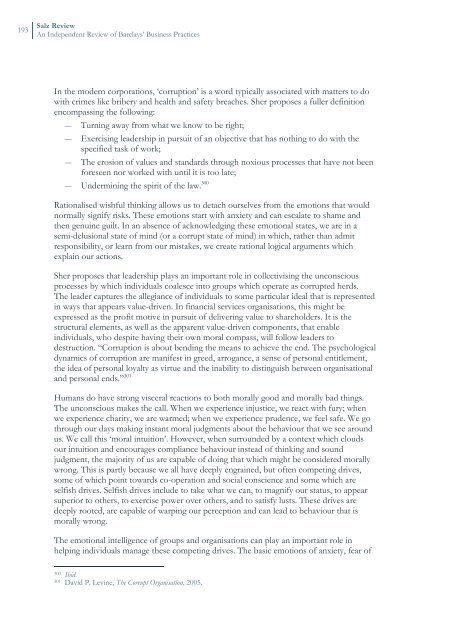Salz Review - Wall Street Journal
Salz Review - Wall Street Journal
Salz Review - Wall Street Journal
Create successful ePaper yourself
Turn your PDF publications into a flip-book with our unique Google optimized e-Paper software.
193<br />
<strong>Salz</strong> <strong>Review</strong><br />
An Independent <strong>Review</strong> of Barclays’ Business Practices<br />
In the modern corporations, ‘corruption’ is a word typically associated with matters to do<br />
with crimes like bribery and health and safety breaches. Sher proposes a fuller definition<br />
encompassing the following:<br />
― Turning away from what we know to be right;<br />
― Exercising leadership in pursuit of an objective that has nothing to do with the<br />
specified task of work;<br />
― The erosion of values and standards through noxious processes that have not been<br />
foreseen nor worked with until it is too late;<br />
― Undermining the spirit of the law. 300<br />
Rationalised wishful thinking allows us to detach ourselves from the emotions that would<br />
normally signify risks. These emotions start with anxiety and can escalate to shame and<br />
then genuine guilt. In an absence of acknowledging these emotional states, we are in a<br />
semi-delusional state of mind (or a corrupt state of mind) in which, rather than admit<br />
responsibility, or learn from our mistakes, we create rational logical arguments which<br />
explain our actions.<br />
Sher proposes that leadership plays an important role in collectivising the unconscious<br />
processes by which individuals coalesce into groups which operate as corrupted herds.<br />
The leader captures the allegiance of individuals to some particular ideal that is represented<br />
in ways that appears value-driven. In financial services organisations, this might be<br />
expressed as the profit motive in pursuit of delivering value to shareholders. It is the<br />
structural elements, as well as the apparent value-driven components, that enable<br />
individuals, who despite having their own moral compass, will follow leaders to<br />
destruction. “Corruption is about bending the means to achieve the end. The psychological<br />
dynamics of corruption are manifest in greed, arrogance, a sense of personal entitlement,<br />
the idea of personal loyalty as virtue and the inability to distinguish between organisational<br />
and personal ends.” 301<br />
Humans do have strong visceral reactions to both morally good and morally bad things.<br />
The unconscious makes the call. When we experience injustice, we react with fury; when<br />
we experience charity, we are warmed; when we experience prudence, we feel safe. We go<br />
through our days making instant moral judgments about the behaviour that we see around<br />
us. We call this ‘moral intuition’. However, when surrounded by a context which clouds<br />
our intuition and encourages compliance behaviour instead of thinking and sound<br />
judgment, the majority of us are capable of doing that which might be considered morally<br />
wrong. This is partly because we all have deeply engrained, but often competing drives,<br />
some of which point towards co-operation and social conscience and some which are<br />
selfish drives. Selfish drives include to take what we can, to magnify our status, to appear<br />
superior to others, to exercise power over others, and to satisfy lusts. These drives are<br />
deeply rooted, are capable of warping our perception and can lead to behaviour that is<br />
morally wrong.<br />
The emotional intelligence of groups and organisations can play an important role in<br />
helping individuals manage these competing drives. The basic emotions of anxiety, fear of<br />
300 Ibid.<br />
301 David P. Levine, The Corrupt Organisation, 2005.
















